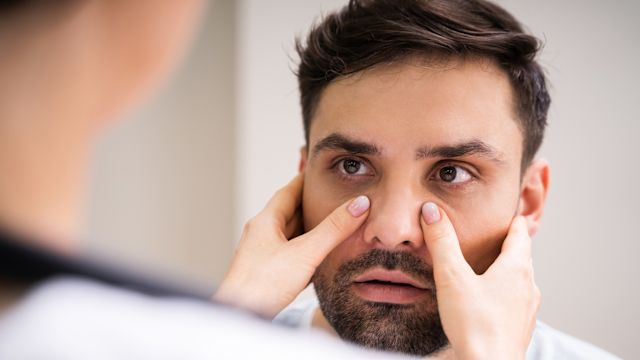When talking to a healthcare provider about any health condition, it helps to prepare for an appointment beforehand.
Nasal polyps are benign growths that form in the nasal passages and sinuses. Shaped like teardrops, they vary in size and may form as individual polyps or in clusters (sometimes said to resemble bunches of grapes). Small polyps may not cause any symptoms. Larger polyps or clusters of polyps can make breathing difficult, blocking airways and leading to congestion, sinus infections, loss of smell, and other symptoms.
Below are some questions that you may want to discuss with your healthcare provider during your appointment.
What caused my nasal polyps?
Before going to your appointment, take a few minutes to write down the symptoms you are experiencing, previous health conditions you have been treated for, any medications or supplements you are taking, and any known allergies. This information can be helpful to your healthcare provider.
While healthcare experts do not know why some people get nasal polyps and others do not, there is a known association between nasal polyps and chronic inflammation in the nasal passages and sinuses. Your healthcare provider will likely discuss your medical history, specifically asthma, allergies, sinus infections, and any respiratory problems you’ve experienced in the past.
What tests do I need?
Your healthcare provider may be able to diagnose nasal polyps by checking your nasal passages, sometimes with a procedure called a nasal endoscopy. This procedure uses a thin, flexible camera to check inside the nose and nasal passages. Your healthcare providers may also order an imaging test called a CT scan to determine the exact locations and size of the polyps.
Do I have aspirin sensitivity?
Nasal polyps can be associated with a condition called AERD, which is a combination of asthma, chronic sinusitis, nasal polyps, and an aspirin sensitivity. With AERD, aspirin and other NSAIDs trigger respiratory symptoms. For some, the condition can also cause hives and GI symptoms, like nausea or abdominal pain. Your healthcare provider may want to do a test to see if you have aspirin sensitivity.
What complications can nasal polyps cause?
Nasal polyps can cause a number of complications, including chronic or recurring sinus infections. In some cases, nasal polyps can cause more serious infections—in the tissues around the brain and spinal cord, in the sinus bones, in the tissues around the eyes. The condition can also lead to obstructive sleep apnea, a sleep disorder where breathing stops and restarts during sleep due to the airways being blocked.
How are nasal polyps treated?
Treatment for nasal polyps can include medications and surgery. Treatment will depend on an individual’s medical history and the severity of the polyps. The best approach to treatment will be different for each person:
- Treatment usually begins with nasal corticosteroids, including sprays and rinses. Corticosteroids are anti-inflammatory drugs that can help relieve symptoms and shrink polyps. Nasal corticosteroids can be used long-term.
- A nasal saline rinse is often prescribed alongside nasal corticosteroids. These help to clean the sinuses, washing out substances that can contribute to infections or inflammation.
- Short courses of oral corticosteroids can also be prescribed. Oral corticosteroids can only be used for short periods of time.
- Non-steroid medications called leukotriene inhibitors may also be prescribed. These medications block or stop the production of inflammatory chemicals called leukotrienes.
- Allergy therapies may be prescribed to help keep polyps from growing back or getting worse.
- If a person has a sinus infection caused by bacteria, it can be treated with antibiotics. (This does not apply to sinus infections caused by viruses).
- Surgery is another treatment option. More specifically, endoscopic surgery, which uses a thin, flexible tube equipped with lights, a camera, and small surgical instruments. Usually, a person can go home the same day they have this type of surgery.
- There is also a biologic drug that is prescribed to treat some cases of chronic rhinitis with nasal polyps. This drug is given by injection and acts on specific pathways in the immune system to reduce inflammation.
It is important to know that polyps can come back after treatment. While you may not be able to prevent polyps from coming back entirely, you can take steps to get the most out of treatment. The first and most important step is to work with your healthcare providers and follow your treatment plan—taking all medications as prescribed and attending all follow-up appointments. Newer treatments, such as biologic therapy, may help prevent nasal polyps from recurring.



